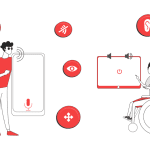- December 16, 2024
- by Christopher
- Web Development, WordPress Development
WordPress has been the go-to platform for businesses, developers, and content creators for decades. Known for its flexibility, ease of use, and an extensive ecosystem of plugins and themes, it powers over 40% of websites on the internet. But as digital experiences evolve, so do the demands placed on content management systems (CMS). Enter Headless WordPress CMS—a modern solution that separates the frontend (what users see) from the backend (where content is managed).
This post dives into why Headless WordPress might be the game-changer your project needs.
What Is Headless WordPress?
Traditional WordPress integrates the backend (WP Admin) and frontend (themes/templates) tightly. With Headless WordPress, the CMS acts solely as a content repository, while the frontend is handled by a separate technology (e.g., React, Vue.js, or Angular). The two communicate via the WordPress REST API or GraphQL.
This decoupled architecture provides unparalleled flexibility and performance benefits that cater to modern web development needs.
Why Choose Headless WordPress CMS?
1. Speed and Performance
Headless WordPress enables faster loading times by leveraging modern frontend frameworks and technologies like static site generators (e.g., Next.js). These tools optimize your site for speed through techniques like pre-rendering and lazy loading.
2. Enhanced Security
By decoupling the frontend, the WordPress backend is not directly exposed to users, reducing the risk of common vulnerabilities such as SQL injections or brute-force attacks.
3. Greater Frontend Flexibility
You are no longer limited by WordPress themes or PHP templates. Headless WordPress allows you to build a completely custom frontend using modern frameworks like React, Angular, or Vue.js.
4. Omnichannel Content Delivery
Content isn’t limited to a single website. With Headless WordPress CMS, you can push content to multiple platforms—websites, mobile apps, IoT devices, or even digital signage—using APIs.
5. Future-Proof Development
Frontend technologies evolve rapidly, and headless architecture allows you to upgrade or switch frontend stacks without reworking the entire backend.
6. Scalability
Headless setups handle traffic spikes more efficiently, making it ideal for high-traffic websites or those expecting growth. By separating the frontend and backend, you can scale each independently based on your needs.
7. Better Developer Experience
Developers love the freedom to choose tools and frameworks they’re most comfortable with. The decoupled nature of Headless WordPress CMS also fosters cleaner and more modular codebases.
Who Should Consider Headless WordPress?
1. Businesses Requiring Custom User Experiences
If you want to deliver unique, interactive, or app-like experiences to your users, Headless WordPress CMS gives you the freedom to design without limits.
2. Companies With Omnichannel Needs
For businesses publishing content across multiple platforms, a headless CMS ensures seamless content distribution.
3. Enterprises with High Performance Demands
E-commerce stores, media sites, or businesses with global audiences benefit from the speed and scalability of a headless setup.
4. Development Teams with JavaScript Expertise
Teams proficient in modern JavaScript frameworks like React or Vue.js can take full advantage of Headless WordPress’s flexibility.
Potential Challenges
While Headless WordPress is powerful, it’s not for everyone. Consider these potential challenges before diving in:
- Complexity: A headless setup requires more technical expertise to implement and maintain.
- Cost: Decoupling frontend and backend can lead to higher development costs initially.
- Plugin Compatibility: Many WordPress plugins assume a traditional setup and might not work seamlessly in a headless environment.
- Learning Curve: Your team might need to learn new tools and frameworks to work effectively with a headless stack.
Conclusion: Is Headless WordPress CMS Right for You?
Headless WordPress is a forward-thinking solution for businesses looking to future-proof their digital presence. It’s particularly useful for high-traffic websites, custom user experiences, and omnichannel content delivery. However, it’s not the best fit for everyone, especially if you don’t have the technical resources or budget to support it.
If you’re curious about exploring Headless WordPress CMS, consider consulting with a professional development team (like us at Stafflancer). We specialize in building custom WordPress solutions that align with your business goals. Whether you’re looking to go headless or optimize your traditional WordPress setup, we’ve got you covered!
Need help deciding if Headless WordPress is the right move? Let’s chat. Contact us for a consultation today!


